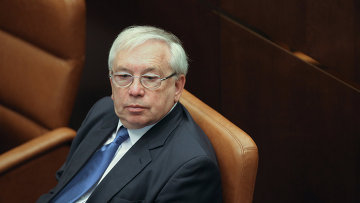MOSCOW, September 3 (RAPSI) - Russian Human Rights Commissioner Vladimir Lukin has lodged an appeal against some provisions of the controversial federal law which brands NGOs funded from abroad and engaged in political activities as foreign agents, Kommersant daily reported Tuesday.
"The document's provisions containing such definitions as 'foreign agents' and 'political activities' are politically and legally unspecific," Lukin said. According to the newspaper, the complaint was submitted to the Constitutional Court on August 30. It must be considered for three months.
On August 23, the Constitutional Court registered a complaint filed by a group of Russian human rights activists about the law.
The complaint was lodged by the Kostroma Center for Civic Initiatives Support which was fined last May 300,000 rubles (app, $9,000) for breaching the law. Alexander Zamaryanov, executive director of the NGO, was personally fined 100,000 rubles (app. $3,000) in the case. The prosecutors claimed that the NGO received funds from abroad and was engaged in political activities, but failed to duly enter the list of foreign agents. According to prosecutors, the organization held a round table panel in February which was attended by an American diplomat.
The NGO filed an application with the local court protesting the fine, but the decision was upheld.
The organization complains in its application to the Constitutional Court that the unclear explanation of political activity in the law leads to ambiguity and, consequently, to overlooking and constitutional rights abuse.
A federal law was passed last November requiring all NGOs engaged in political activity, and receiving finance from abroad, to register as a "foreign agents," or face fines of up to 500,000 rubles (app. $16,000). In February eleven Russian NGOs, Moscow Helsinki Group among them, lodged a complaint with the European Court of Human Rights (ECHR) protesting the law.
Inspections of NGOs began in late March 2013 when the Justice Ministry said its goal was to check that these organizations' activities corresponded with the objectives of their charters and Russian legislation. Up to 2,000 rights groups and NGOs in Russia have been raided by prosecutors and other officials, according to some estimates.
Russian president Vladimir Putin has said before that he doesn't see any point in toughening or liberalizing the law but stands for putting things in order. "Some clear criteria for political activity should be set," he said in August at the youth forum at Lake Seliger, an annual gathering in Russia's Tver Region.



